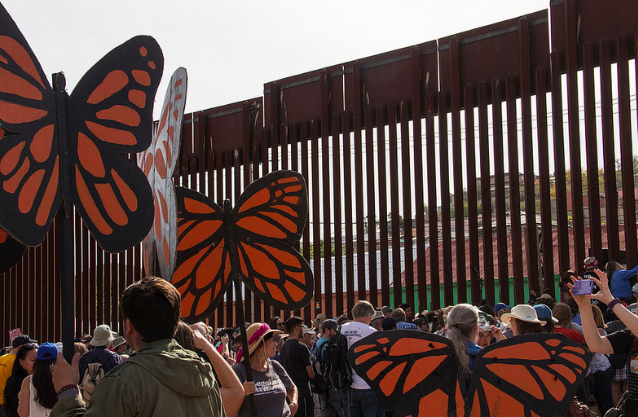Frances Almodovar ’21 thinks critically about privilege and the implications of U.S. citizenship during her time on the borderlands. Read her reflection below.
What is privilege? This is a question that I have been pondering for the last three months. In the course of six days, a word that was once so familiar became a foreign concept. In May, I was given the opportunity to participate in the Kino Border Initiative (KBI). Through KBI, I was able to immerse myself into three completely different communities surrounding the U.S.-Mexico border that challenged my understanding of privilege.
An understanding that saw two sides to a story: one being the side with the “privileged,” those who often have an unfair advantage over those who are “unprivileged.” In this understanding of the word, I was often excluded. I was an outside party willing to label one as “good” and the other as “bad.”
Hearing different perspectives on U.S. immigration policies as presented by ranchers, immigrants and Border Patrol added a level of complexity to the simple story of privilege that I was so familiar with. This was mostly thanks to the tools of reflection presented to me in the preparation stages of the immersion. There were three words that guided all of my reflections: humanize, accompany and complicate.
With each story, I was told to actively work on humanizing the narrator, and on accompanying them through their journey. Through conversation, I found that the complex portion of the immersion was the aspect of self-reflection. While reflecting, I often asked, “What can I do?” or “What am I doing?” These were only some of the questions that arose from hearing and witnessing injustices that immigrants face in our country.
As an American, I have come to the conclusion that it is easy to take ownership of the country I call mine, but it is not always easy taking responsibility for what occurs in what I call mine. It’s as if accepting responsibility is admitting a fault that I do not want to associate with myself and with everything I know. Responsibility is a privilege that my society has not yet conditioned me into acknowledging.
There is strength in responsibility. There is a sense of agency that lingers as one confesses a fault. As Americans, we are conditioned to deny responsibility and instead blame others for our errors. We don’t vote and let them in. A new face to blame.
My privilege is one of millions. I am an American citizen—that is my privilege, and it is one that I am often ashamed of. A privilege that seems outdated and especially cruel. A privilege that has been passed down through generations, often by the process of migration. A privilege that damages then weaponizes. A privilege that feeds on repetition.
What I learned while humanizing, accompanying and complicating at the border is that being an American citizen is a dream seen worthy enough to lose one’s life. There is value in a title that most of us didn’t and don’t have to work for. As an American, I have power. I have an agency that I am not willing to give in the slightest. I have the tools to enable me to cause change. I learned that to stand with someone and to walk along someone else’s path is not always easy.
“I am emotionally exhausted” is a sentence that summed up most of my days on this immersion. I met a lot of people, and I heard a lot of stories. KBI challenged my understanding of justice and gave me the tools to aid in my search for it. That is a privilege that I will use to challenge the privileges that harbor injustices. Today I checked my privilege while reflecting on my encounters throughout the day. I challenged my privileges by asking “What am I doing?” and “How can I use this to help others?”
On the night after we met with Border Patrol agents, it dawned upon me that a broken system uses broken people to break people. Amidst the brokenness that we are now witnessing from all different groups and institutions regarding migration across the U.S.-Mexico border, it is our duty to use our privilege to undo these injustices and fight for humane migration.
Feature Image: Peg Hunter Photo, Courtesy of Flickr



















































































































Anonymous • Nov 14, 2018 at 6:28 pm
0.5
Anonymous • Aug 31, 2018 at 12:34 pm
4.5
Anonymous • Aug 30, 2018 at 9:49 pm
5